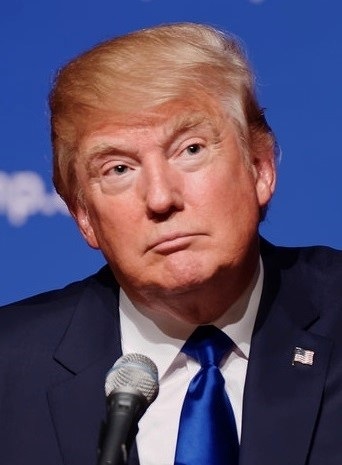 Donald Trump wants to convert religious institutions into campaign halls.
Donald Trump wants to convert religious institutions into campaign halls.
In his nomination acceptance speech last night, the Republican presidential candidate repeated his pledge, now part of the GOP platform, to repeal the Johnson Amendment. Named after then-Sen. (later President) Lyndon B. Johnson, the amendment prohibits tax-exempt organizations from engaging in political campaigns. The law states that nonprofit 501(c)(3)s, which include churches, cannot “participate in, or intervene in (including the publishing or distributing of statements), any political campaign on behalf of (or in opposition to) any candidate for public office.” In short, the IRS prohibition against endorsing or opposing candidates for elected office applies equally to pastors and church officials.
Trump objects to this safeguard, stating in his speech: “[The evangelical community has] so much to contribute to our politics, yet our laws prevent you from speaking your minds from your own pulpits. An amendment, pushed by Lyndon Johnson, many years ago, threatens religious institutions with a loss of their tax-exempt status if they openly advocate their political views. I am going to work very hard to repeal that language and protect free speech for all Americans.”
The amendment in fact does not silence the free speech rights of pastors in this country. Ministers and congregations are free to engage in church electioneering — if they forego their tax-exempt privilege. Religious leaders are free to endorse whomever they choose — so long as they do so on their own time and dime as citizens (a right that many Religious Right leaders take full advantage of). They simply cannot do so from the pulpit as church officials, or expend church resources to electioneer. The choice is theirs: either stay tax-exempt or endorse political candidates from the pulpit.
Tax-exempt 501(c)(3) nonprofits are afforded a special privilege, which amounts to an indirect but major public subsidy. If an organization chooses to be tax-exempt under 501(c)(3), it forfeits the right to engage in political campaign intervention in exchange for this subsidy.
Significantly, churches and church-related charities are exempted from filing the onerous Form 990 annual tax return, which all other (c)(3)s must file to retain tax exemption. The Form 990 ensures accountability to donors, the IRS and the public at large. FFRF has sued the IRS over such discriminatory benefits, and is readying a new challenge imminently.
The pledge for both major political parties in this country ought to be enforcing the Johnson Amendment, not repealing it, as Trump promotes.
For decades, FFRF has been working to ensure enforcement. Since 2006, FFRF has asked the IRS for investigations into 70 situations in which we believe the tax code was violated. Our complaints to the IRS are filed without regard to political affiliation or allegiance. FFRF sent a letter to the IRS regarding a pastor at a church in North Carolina who urged his congregation during worship services to vote for President Obama. And just this year, FFRF sent the IRS letters about Hillary Clinton campaigning at churches that endorsed her during services.
In 2012, FFRF even sued the IRS to compel it to enforce its own regulations barring churches as well as other (c)(3)s from engaging in partisan political activity. We’re proud our lawsuit nudged the IRS to agree to continue to investigate errant churches and ensure that the tax code is being enforced evenhandedly.
The Johnson Amendment isn’t a threat to our democracy. But allowing tax-exempt churches to engage in political campaigning would be. It would open the door to further unregulated money in our politics with zero accountability. Because of their lack of accountability, were tax-exempt churches allowed to engage in electioneering, they could essentially turn into money-laundering operations for political candidates. The result would make the Citizens United fallout look like child’s play. Our secular republic would be at stake.
For more problems with this proposal, see FFRF Staff Attorney Andrew Seidel’s June 23 blog, “Church Politicking: Should churches be able to endorse political candidates?”

